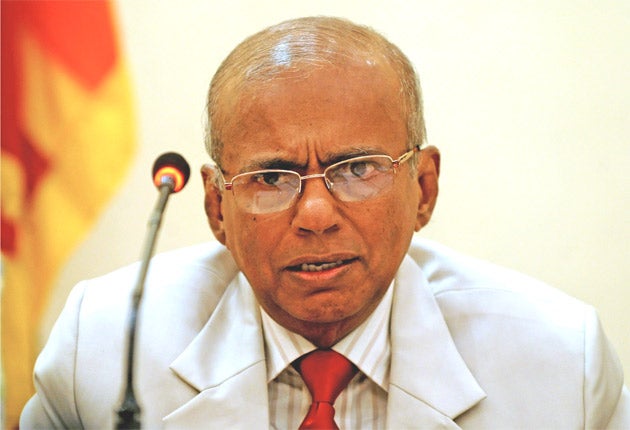Sri Lanka's civil war inquiry is 'eyewash', say Tamils

Your support helps us to tell the story
From reproductive rights to climate change to Big Tech, The Independent is on the ground when the story is developing. Whether it's investigating the financials of Elon Musk's pro-Trump PAC or producing our latest documentary, 'The A Word', which shines a light on the American women fighting for reproductive rights, we know how important it is to parse out the facts from the messaging.
At such a critical moment in US history, we need reporters on the ground. Your donation allows us to keep sending journalists to speak to both sides of the story.
The Independent is trusted by Americans across the entire political spectrum. And unlike many other quality news outlets, we choose not to lock Americans out of our reporting and analysis with paywalls. We believe quality journalism should be available to everyone, paid for by those who can afford it.
Your support makes all the difference.Sri Lanka's investigation into the war against the Tamil Tigers – a conflict that left thousands of civilians dead – has begun amid a barrage of allegations that justice will not be done.
When President Mahinda Rajapaksa announced the commission earlier this year, its purpose was ostensibly to find out why a 2002 ceasefire brokered by Norway, and signed by the government and the Liberation Tigers of Tamil Eelam (LTTE), broke down. Its chairman, C R de Silva, said in his opening remarks yesterday that the time had come to "consolidate the military victory by addressing the root causes of the conflict and establish national integrity and reconciliation".
But several human rights groups, along with organisations representing the country's Tamil minority, who have long complained of being marginalised, believe the inquiry was designed to deflect UN and other international demands for an investigation into the final stages of the war, in which more than 10,000 Tamil civilians may have been killed. Crucially, the government-appointed inquiry has no mandate to examine this aspect of a conflict which is estimated to have claimed more than 70,000 lives over 30 years.
Suren Surendiran, a senior member of the Global Tamil Forum, said: "Sri Lanka has fooled the international community for so long and this commission is another one of those eyewashes. All we ask is justice for the thousands who perished in the last few weeks and months and years leading up to the end of the war last year."
In June, the UN Secretary General, Ban Ki-moon, appointed a three-member panel to advise him on ensuring accountability for the alleged abuses during the war, which ended with the crushing of the last remnants of the LTTE forces in the late spring of 2009.
As well as accusing them of indiscriminate shelling, rights groups have claimed that government forces blocked access to food and medicine for minority Tamil civilians trapped in the war zone. The rebels have been accused of holding civilians as human shields, killing those trying to escape the violence and forcibly recruiting children as fighters.
The International Crisis Group think tank said in a report early this year that at least 30,000 civilians could have died in the last phase of the fighting. Earlier this week, a group of 57 US lawmakers wrote to the Secretary of State, Hillary Clinton, urging her to push for an international investigation.
Sri Lanka has angrily refused to cooperate with the UN panel or issue visas for its members, saying an external panel is an infringement of the country's sovereignty.
Join our commenting forum
Join thought-provoking conversations, follow other Independent readers and see their replies
Comments